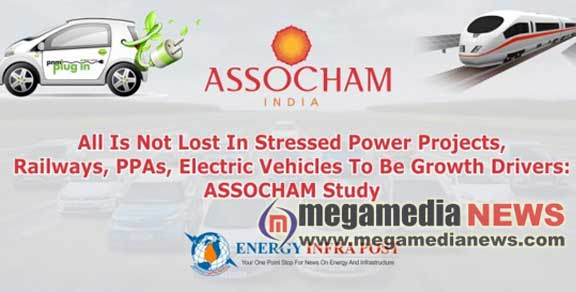All is not lost in stressed power projects; Railways, PPAs to be growth drivers: ASSOCHAM
11:35 AM, Tuesday, January 9th, 2018 Mangaluru: As many as 24 power projects with 41.81 GW capacity may be under a severe financial stress, but the troubled sector still holds hope in growth drivers including higher demand from the Railways, proposed law to enforce power purchase agreements (PPAs) on the discoms, increasing focus on electric vehicles and reaching electricity to all un-electrified villages, an ASSOCHAM study has noted.
Mangaluru: As many as 24 power projects with 41.81 GW capacity may be under a severe financial stress, but the troubled sector still holds hope in growth drivers including higher demand from the Railways, proposed law to enforce power purchase agreements (PPAs) on the discoms, increasing focus on electric vehicles and reaching electricity to all un-electrified villages, an ASSOCHAM study has noted.
“Stressed assets remain a key concern for power sector in India. Out of the 24 stressed projects having capacity of 41.81 GW, 8,300 MWs are without any power purchase agreements (PPA), 9500 MW capacity are having partial PPAs (i.e. less than 40%). The balance capacity is having PPAs greater than 40%. Avenues need to be found out to utilize the power available in the stranded capacities, which are already commissioned or nearing completion,” the study stressed.
“Our assessment shows that all is not that bad, as is made out by stock analysts or the bankers getting panicky, having financed the big projects. There are good prospects, provided we are able to enforce PPAs and work on the plans already finalised,” said ASSOCHAM Secretary General D S Rawat.
The Government proposes to amend the law making obligation under PPA, statutorily binding all discoms to have PPAs to cover 100% requirement. While there are insufficient PPAs, even today around 5 crore household remain un-electrified. Electrification of these household would lead to increase in demand.
Besides, cold storages in the country are mostly run with the help of off-grid power because of reliability issues. Therefore, demand of the cold storages should be met with grid power by providing necessary infrastructure.
Similarly, Indian Railways have taken great initiative for electrification. About 50% of the Railways is presently electrified. It is expected that the railway load is expected to exceed 3000 MW by 2021-22 from a current traction load of 2000 MW thus opening a potential of demand creation.
In view of large capacity addition of Renewable Energy sources in the country, strict enforcement of renewable purchase obligations (RPO) has become necessary. In fact one amongst the various amendments proposed in the Electricity Act is the strict enforcement of RPO.
It would require investments in technology, grid balancing, green corridor, in peaking power. By and large, electricity is emerging as the primary source of energy as electric mobility is more efficient than mobility by petrol or diesel, the only thing required is the prices of the battery of storage systems to come down.
Combination of solar power and Electric Vehicle is the key to significantly reducing our dependence on fossil fuels and are the natural evolution of our energy infrastructure.
In addition, storage is going to be next frontier for India’s clean energy push and the batteries in Electric Vehicles offer a potential solution, the paper added.
Simillar Posts
Warning: count(): Parameter must be an array or an object that implements Countable in /home/megamcaq/public_html/wp-content/plugins/post-plugin-library/common_functions.php on line 357
- None Found
Leave a Reply
© Copyright 2008 www.megamedianews.com All Rights Reserved. Privacy Policy








 Posted in
Posted in  Tags:
Tags: 






